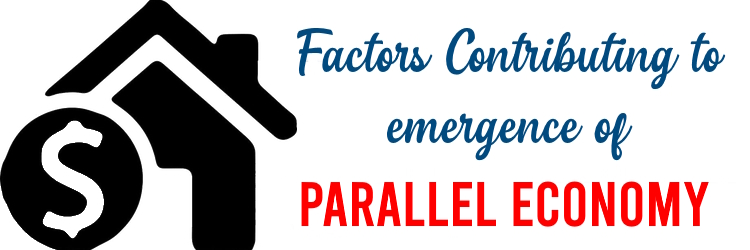Factors Contributing to the Emergence of Parallel Economies
The parallel economy exists in many countries around the world and can have significant economic, social, and political implications. In this context, understanding the factors that contribute to the parallel economy is crucial for policymakers, economists, and researchers alike..

Table of Contents
- 1 Factors Contributing to emergence of Parallel Economies
- 1.1 High Tax Rates and Complex Tax System
- 1.2 Corruption and Lack of Trust in Government
- 1.3 Lack of Access to Formal Credit
- 1.4 Inefficient Government Services
- 1.5 Lack of Education and Skill Development
- 1.6 High Business Costs
- 1.7 Lack of Access to Markets and Limited Economic Opportunities
- 1.8 Lack of Social Protection
- 1.9 Inadequate Infrastructure and Natural Disasters
- 1.10 Cultural and Social Norms
- 1.11 Illegal Activities
- 1.12 Globalization
- 1.13 Political Instability
- 1.14 Technology
- 1.15 Conclusion
Factors Contributing to emergence of Parallel Economies
The following are some potential factors that may contribute to the emergence and sustenance of a parallel economy.
High Tax Rates and Complex Tax System
High tax rates and complex tax systems can make it challenging for individuals and businesses to understand and comply with tax laws. As a result, they may choose to operate in the informal sector to avoid the hassle of tax compliance, leading to a loss of tax revenue for the government.
Corruption and Lack of Trust in Government
Corruption can create an environment of distrust and lack of confidence in the government’s ability to provide basic services and protect individuals and businesses’ rights. This lack of trust can encourage them to operate in the informal sector, leading to a parallel economy.
Lack of Access to Formal Credit
Many individuals and businesses in the informal sector do not have access to formal credit. As a result, they may resort to informal sources of credit, such as loan sharks, to meet their financial needs.
Inefficient Government Services
Inefficient government services can also drive individuals and businesses to the parallel economy. When government services such as licensing, permits, and inspections are slow, bureaucratic, or require bribes, individuals and businesses may choose to operate in the informal sector to avoid these obstacles.
Lack of Education and Skill Development
Many individuals in the informal sector do not have access to education or skill development programs. As a result, they may lack the skills and knowledge necessary to operate in the formal economy.
High Business Costs
High business costs, such as rent, utilities, and labor, can make it difficult for businesses to operate in the formal economy. These costs may be lower in the informal sector, encouraging businesses to operate outside of the formal economy.
Lack of Access to Markets and Limited Economic Opportunities
Lack of access to formal markets and limited economic opportunities can drive individuals to the informal sector. When formal sector jobs are scarce or pay low wages, individuals may choose to start their own businesses in the informal sector, contributing to the parallel economy.
Lack of Social Protection
Individuals and businesses in the informal sector may not have access to social protection programs such as health care, insurance, or retirement benefits. This lack of social protection may make it difficult for them to operate in the formal economy.
Inadequate Infrastructure and Natural Disasters
Inadequate infrastructure and natural disasters can create obstacles for businesses to operate in the formal economy, leading them to resort to the informal sector to meet their basic needs.
Cultural and Social Norms
Cultural and social norms can also play a role in the parallel economy. In some societies, it may be more socially acceptable to operate in the informal sector, leading to a larger parallel economy.
Illegal Activities
Some individuals and businesses in the informal sector may engage in illegal activities, such as smuggling or counterfeiting, to generate income. These illegal activities can contribute to the size of the parallel economy.
Globalization
Globalization can also contribute to the parallel economy. As countries become more interconnected, it may be easier for individuals and businesses to operate in the informal sector and avoid paying taxes or complying with regulations.
Political Instability
Political instability can create an environment of uncertainty, making it difficult for individuals and businesses to operate in the formal economy. This instability may encourage individuals and businesses to operate in the informal sector.
Technology
Technology can create new opportunities for individuals and businesses to operate in the informal sector. For example, online marketplaces may provide an avenue for individuals to sell goods and services without operating in the formal economy.
Conclusion
Parallel economy is a complex phenomenon that exists in many countries around the world. It can have significant economic, social, and political implications, as it often operates outside of formal regulations and taxation systems. The factors that contribute to the emergence and sustenance of the parallel economy are diverse, ranging from high tax rates and corruption to inadequate infrastructure and cultural and social norms.
Policymakers, economists, and researchers alike must understand these factors to develop effective policies that can reduce the size of the parallel economy and encourage individuals and businesses to operate in the formal economy. By addressing these challenges, governments can increase tax revenues, create more economic opportunities, and provide social protections for those who need it most.



